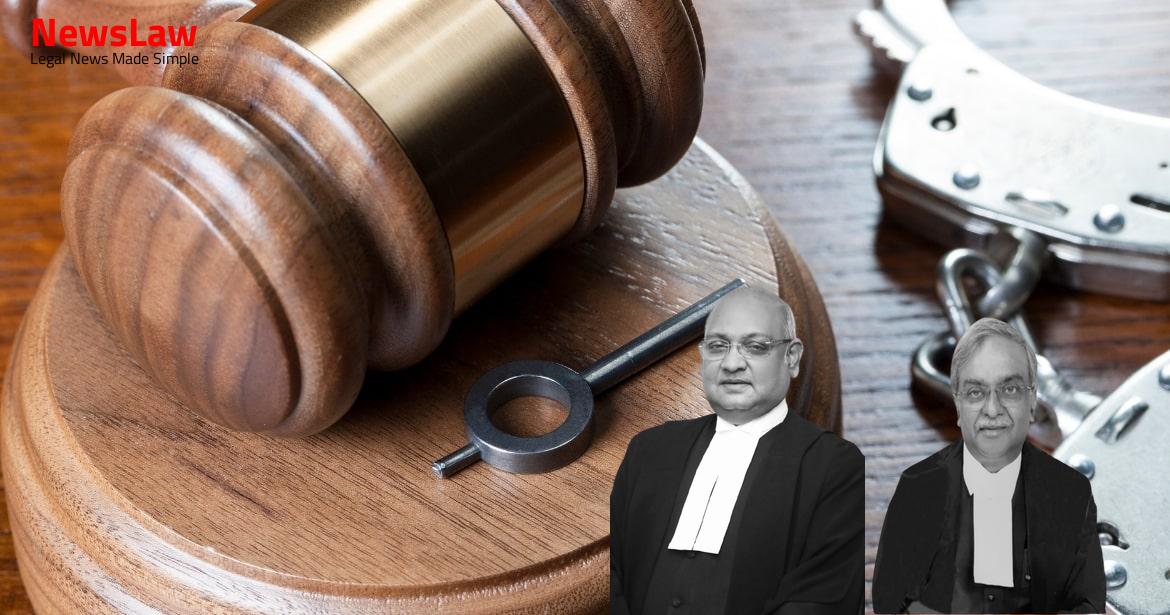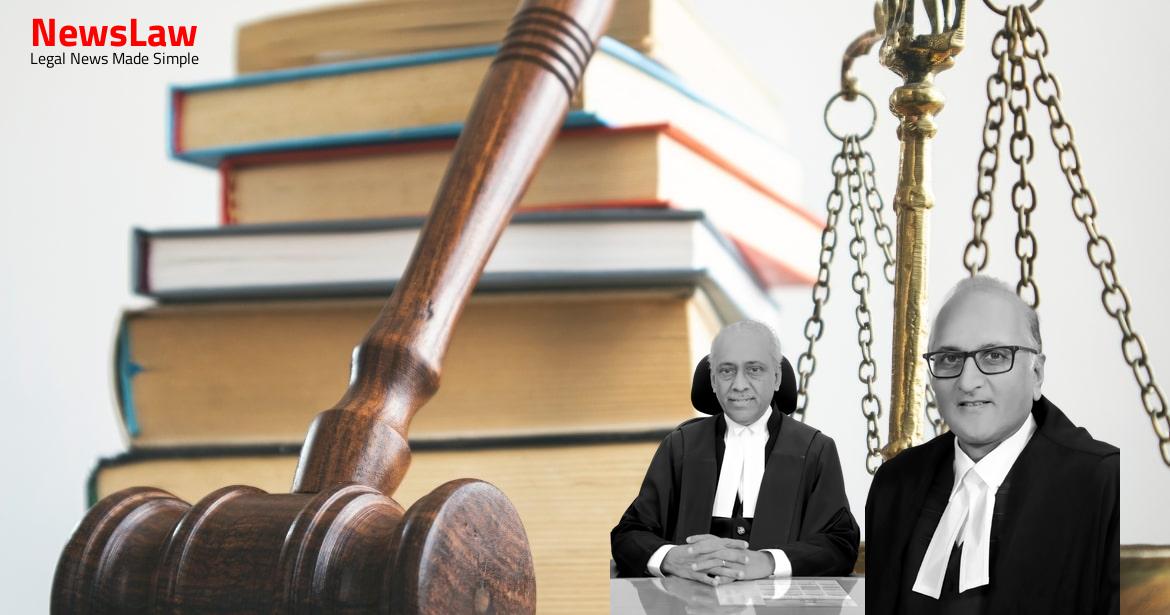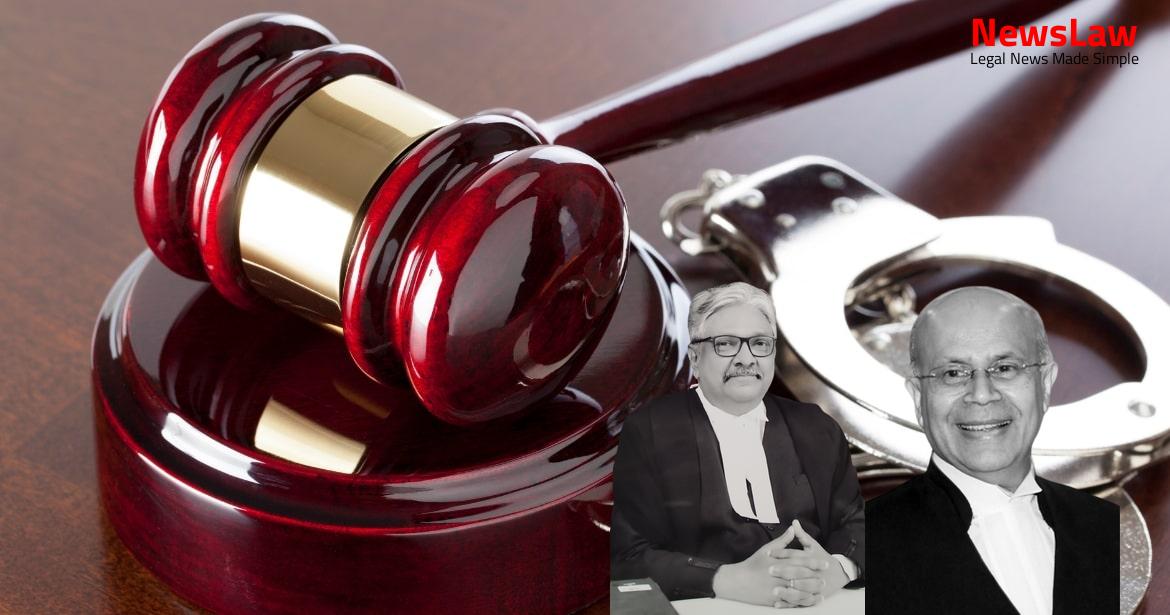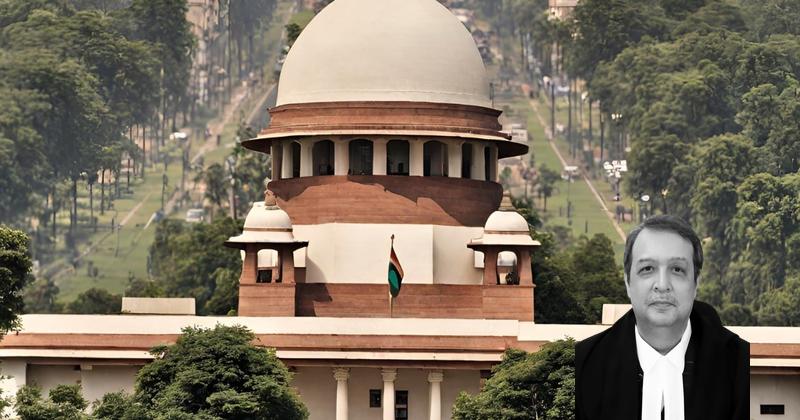The recent court decision delves into the interpretation of Section 69(2) of the Act of 1932 in the context of a suit filed by an unregistered firm. The case highlights the court’s legal analysis on whether the suit falls within the scope of the restriction imposed by this section. Understanding the implications of this provision on the case is crucial in dissecting the complexities of the legal framework governing unregistered partnership firms.
Facts
- The Trial Court rejected the application to reject the plaint on the grounds that the suit filed by an unregistered partnership firm was barred by law.
- The High Court confirmed the Trial Court’s conclusion that the transaction in question was independent and not related to the firm’s business transactions.
- The plaint requested the sale deed to be declared fraudulent, illegal, and void, and for the respondents to have no right to scheme on the suit land.
- The High Court considered the submissions of the respondents with reference to Order XXX Rules 1 and 2 CPC read with Section 69 of the Act of 1932.
- The Trial Court’s finding that the dismissal of the suit was not justified under Order XXX CPC was highlighted.
- The Trial Court ruled that the bar of Section 69(2) was not applicable to this suit concerning the validity of the sale deed.
- The plaintiff-appellant purchased a property with respondent Nos. 2 and 3 for a project related to the suit property.
- Respondent Nos. 2 and 3 later formed a new firm ‘Aksharay Developers’ without including the plaintiff and respondent No. 4.
- The appellant was unaware of this new firm being registered and believed that the suit property was being sold to a firm in which he was a partner.
- A partnership firm named ‘Aksharay Developers’ was earlier formed with four partners including the appellant, respondent Nos. 2, 3, and 4.
- Allegations include obtaining the suit property through conspiracy, non-payment of sale consideration, and dishonoured cheques.
- The appellant seeks perpetual injunction and declares the sale deed as null and void.
Also Read: Legal Analysis on Alleged Multiple Agreements in Property Sale Case
Issue
- The primary issue in this matter is whether a suit by an unregistered firm, seeking permanent injunction and damages for trademark infringement under statutory rights or common law passing-off principles, is barred by Section 69(2) of the Act of 1932.
- The High Court held that the plaintiff, being an unregistered firm, would be barred from enforcing a right arising out of a contract in accordance with Section 69(2) of the Act of 1932.
- The determination revolves around whether the subject suit filed by an unregistered partnership firm falls within the scope of the restriction imposed by Section 69(2) of the Act of 1932.
Also Read: Ensuring Maintenance Rights: Court’s Legal Analysis
Arguments
- The respondent’s contention was that the suit filed by the unregistered partnership firm was barred by Section 69 of the Act of 1932.
- The respondents argued that the suit for a declaration against a registered sale document, without the plaintiff being a registered firm, was non-maintainable.
- The respondents cited cases to support their argument that any suit by an unregistered partnership firm is hit by Section 69 of the Act of 1932.
- The High Court, based on the respondent’s arguments, rejected the plaint filed by the appellant firm.
- The contesting respondents submitted that there was no evidence of the suit firm being a registered partnership firm in the application for rejection of the plaint.
- Learned counsel for the appellant argued that Section 69(2) of the Act of 1932 does not bar all suits by an unregistered partnership firm against third parties.
- The judgment in question does not assist the respondent as it dealt with a contract not entered into by an unregistered firm in the course of its business.
- The suit in consideration arose from a contract which the unregistered firm was a party to, and the claim is based on that contract, making it maintainable.
- Counsel emphasized that Section 69(2) does not restrict suits by an unregistered partnership firm for enforcement of statutory or common law rights.
- The Trial Court and High Court both found that the contract in question was not related to the business of the unregistered firm, supporting the maintainability of the suit.
- The plaintiff-appellant argued that specific fraud was alleged, and the defendants entered the contract in their independent capacity before converting it into a registered sale deed.
- The appellant’s right to enforce the terms of the sale document was supported by law, and the suit was deemed not barred by Section 69(2) of the Act of 1932.
- The High Court was criticized for broadening the scope of Section 69(2) to include all suits by unregistered firms against third parties.
- The sale document was executed by the administrator-partner of the unregistered firm, not in his individual capacity.
Also Read: Legal Analysis: High Court’s Critique of Authority Actions
Analysis
- Suit not barred by Section 69(2) if statutory or common law rights are being enforced.
- Composition of defendant firm ‘Aksharay Developers’ questioned by plaintiff.
- Partnership dissolution deed allocated trademark rights between Moolchand and Smt. Kamla Devi.
- Section 69(2) not applicable to all contracts mentioned in the plaint.
- Subject suit for avoidance of document due to fraud, misrepresentation, and statutory rights.
- Plaintiffs claimed injunction, damages, destruction, and rights to trademark use.
- High Court judgment failed to consider relevant principles and prior decisions.
- Case does not involve a contract-based suit, focuses on common law and statutory rights.
- Unregistered firm can sue for enforcement of statutory or common law rights.
- Sale transaction not part of appellant firm’s business does not bar suit under Section 69(2).
- The relevant provision being analyzed is Sub Section 2 of Section 69, which states that an unregistered firm cannot institute a suit to enforce a right arising from a contract against a third party.
- In the case at hand, the plaintiff firm, being unregistered, entered into a sale contract with the defendants, who are third parties, making the suit seemingly not maintainable.
- The interpretation question is whether the restriction under Section 69(2) is limited to situations where an unregistered firm is enforcing a right from a contract with the defendant or if it can be extended to any contract mentioned in the complaint that is not related to the defendant.
- The key consideration is whether the phrase ‘arising from a contract’ in Section 69(2) has a narrow or broad application in restricting suits by unregistered firms.
- In the case of Raptakos Brett Co. Ltd. v. Ganesh Property, it was held that Section 69(2) cannot bar the enforcement by way of a suit by an unregistered firm in respect of a statutory right or a common law right.
- In Farooq case, it was found that the suit based on a partnership deed clause attracted the bar of Section 69(2) as it was to enforce a right arising from the terms of the partnership deed.
- The contract referred to in Section 69(2) must not only be with a third-party defendant but also entered into by the plaintiff firm in the course of the business dealings with such third-party defendant.
- Reference to the case of Purushottam emphasized that the bar of Section 69(2) will not apply if the right sought to be enforced does not arise from a contract to which the unregistered firm is a party or is not connected to the business of the unregistered firm with a third party.
- Section 69(2) of the Act of 1932 does not apply to the present case.
- The case is governed by the principles laid down in Raptakos Brett & Co. Ltd. and Haldiram Bhujiawala cases.
- The bar of Section 69(2) is not attracted to the suit filed by the appellant.
- The Trial Court rightly rejected the baseless application moved by the contesting respondents.
Decision
- The appeal is allowed, setting aside the impugned judgment and order of the High Court of Gujarat.
- The order passed by the Additional Senior Civil Judge in Special Civil Suit No 333 of 2015 is restored.
- The Trial Court is directed to proceed with the trial of the suit in accordance with the law.
- The impugned order of the High Court is set aside as it did not conform to applicable legal principles.
Case Title: SHIV DEVELOPERS THR. SUNILBHAI SOMABHAI AJMERI Vs. AKSHARAY DEVELOPERS (2022 INSC 119)
Case Number: C.A. No.-000785-000785 / 2022



